

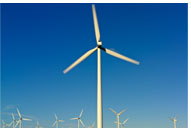
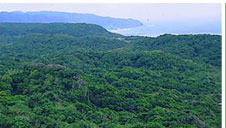
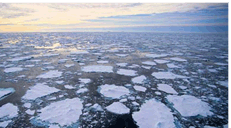
World Environment Day 2021 |
||||||||
Virtual Workshop on World Environment Day 2021 on "Ecosystem Restoration: Ocean and COVID-19" The World Environment Day 2021 theme this year was “Ecosystem Restoration”. The CCRI Science Campaign as virtual workshop was held on ‘Ecosystem Restoration: Ocean and COVID-19’in collaboration with the India International Centre on 4th June 2021 having eminent speakers. Dr. Hari Narain Srivastava, Former Additional Director General, India Meteorological Department, New Delhi chaired the event. He observed that our efforts should be to reduce plastic waste and find new material which could be recycled and made use of in fighting COVID.Dr. M. Sudhakar, Former Director, Centre for Marine Living Resources & Ecology, Kochi and Adviser, MoES as co-chair andmoderator observed that COVID -19 provided an opportunity to study oceans and collect a very important and critical data set. Dr. (Mrs) Malti Goel, President CCRIas lead speaker introduced the theme. She said oceans are well known feedbacks to climate system on earth as oceans store thousand times more heat than the atmosphere and act as climatic buffers.She recalled important programmes of DST to address these concerns namely MONTBLEX and TOGA-I executed way back in 1990s. The Sagarmala project has been launched by Govt. of India for comprehensive development of 7500km coast line. She said that Ocean, Climate, Human health, marine ecosystem, and Biodiversity are interlinked and Ecosystem restoration demands “One Planet, One Ocean, One Health!” Dr. Ramaiah Nagappa, Former Chief Scientist, Professor at AcSIR and Former Deputy Director, CSIR-NIO, Goa delivered keynote address on ‘Post COVID-19 Measures for Sustainable Harnessing of Marine Bioresources. He said the world enjoys 620000km boon of coastal length of which India has a share of less than 1% (0.8%). Indian Ocean with 70 million km2 area has nearly 7500km of coastline. India’s exclusive economic zone (EEZ) is about 2.01 million km2. For every kilogram of seafood sold, Carbon Footprint of Product (CFP) left is ~1.44Kg CO2. Apart from the impact of COVID-19, the biological resources at sea are facing many other threats, like ENSO Events (El Nino- Southern Oscillation) which occur every two-to-three years, cyclones, tsunami, deficit resolve, policy vacuum, and relegation. For the health of our seas, and sustained outcomes, we need to have national cooperation to take pollution control measures. He concluded by highlighting the 5Is as Institute, Implement, Impart, Innovate and Ideas. For ecosystem restoration and health of our seas, national & international collaboration are vital. Sustained outcomes demand pollution control measures, more scientific observations in seas and reducing single use plastic. |
||||||||
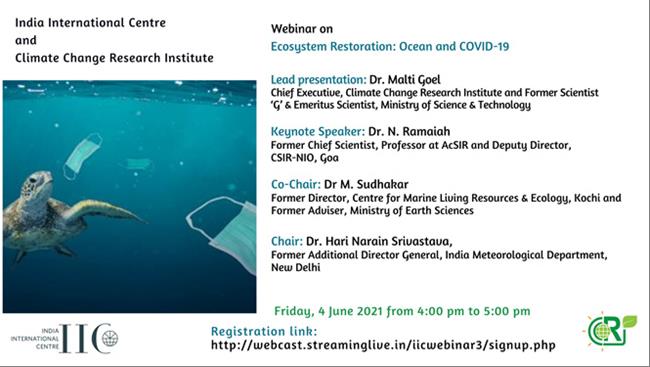
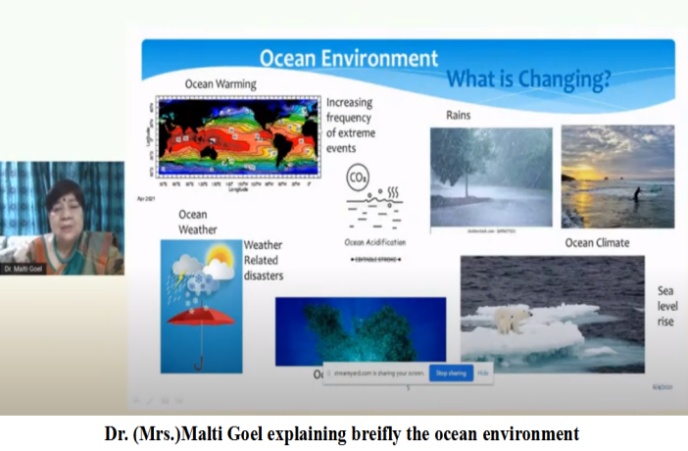
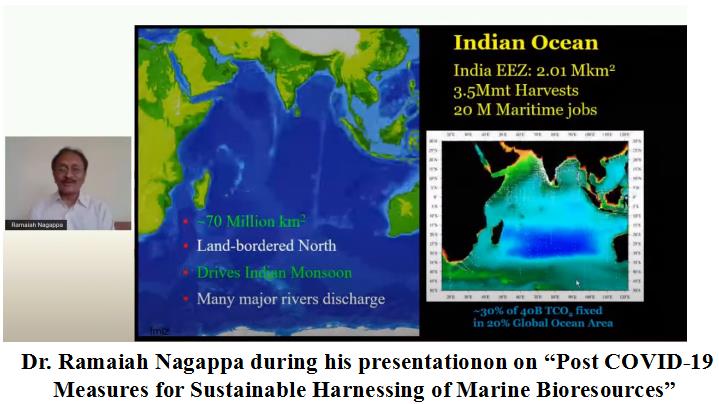 |
||||||||
Home | About us | Member | Brochure | Highlights | Education & Awareness | Our Patrons | Disclaimer | Copyright | Gallery | Contact |
||||||||
| Copyright © Climate Change Research Institute |
|